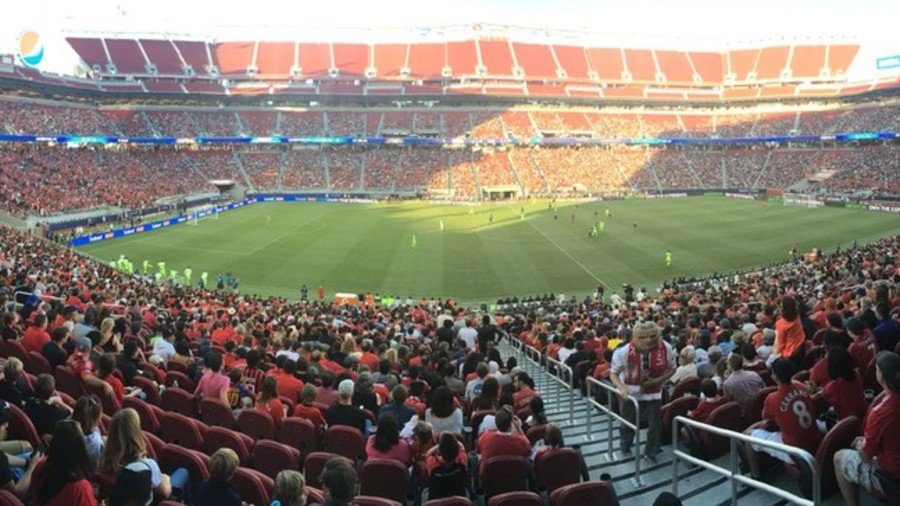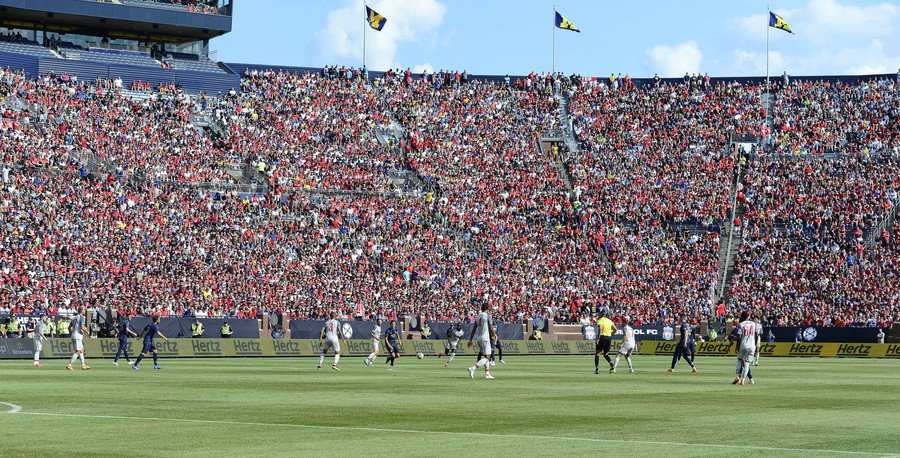Against modern football? The controversy behind the La Liga & Relevent Sports deal
When I first heard the news of La Liga’s deal with US company Relevent Sports to host one Spanish league game on American soil each season, I for one was hardly surprised.
Having covered the 2016 International Champions Cup (ICC) across the US, the tournament which Relevent has been proudly organizing since 2013, brings together the top European clubs across the Atlantic for summer pre-season tours - the company’s motifs and aspirations were as clear as daylight to me.
On the one hand – and that’s where Relevent should certainly take a lot of justified credit – it really is about making football more popular in the land of baseball, college basketball and NFL. Especially since I witnessed with my own eyes while living State-side for three years how the world’s most popular game was both underappreciated and, at the same time, gradually becoming more popular. I even put my son into a local soccer school close to the outskirts of Washington DC – and the amount of other parents signing their children up for these beginner sessions was astounding.
READ MORE: Merkel on Ozil debate: ‘Mistreatment of immigrants must be taken seriously’
So, in that respect, Relevent’s pet project has been significant. No one cared that these games were mere friendlies. No one cared that some big names did not make the squads during these tours – then-Real Madrid superstar Cristiano Ronaldo was the most high-profile absentee during last year’s friendly version of ‘El Clasico’ in Miami. And no one cared that ticket prices for what were essentially meaningless games sometimes went through the roof – the cheapest seats for the above-mentioned Real-Barca friendly at Miami’s Hard Rock stadium went for $300 (which, at the time, could get you a season ticket for all home games of Atletico Madrid).
For the US-based fans, this was an absolute joy. My first-hand experience was travelling with the Liverpool FC supporters in 2016 during the US Summer tour – from the West Coast to the very heart of the US in St. Louis, Missouri, – and I saw how elated they were to see their heroes with their own eyes. The logic of - ‘I’m ok with paying a few hundred bucks to watch my team I would otherwise pay several thousand to see’ - prevailed. Fair enough.
But I’ll say this without a shadow of doubt - hosting these exhibition tournaments to keep the US-based crowds entertained is as far as that concept should have gone.

Which brings me to the other hand in this story: Relevent’s strong capitalistic approach to the game. The game which has been suffering from heavy commercialization over the past several decades. So with shouts that big money is ruining the beautiful game clearly heard on just about every corner, the US company’s cash-driven initiative adds so much fuel to the fire - as well as setting quite a dangerous precedent.
FOOTBALL WITHOUT FANS IS NOTHING ©
While filming a report about the La Liga-Relevent deal, I reached out to Ale Romero – a world-renowned pianist and musical director of Cirque du Soleil. Whenever he’s not touring the world with the grandiose show, he’s a regular at Estadio Benito Villamarin – home to Real Betis, one of La Liga’s most prominent teams. Coincidentally, I spoke about the controversial deal with Ale while he was on vacation in New York, proudly sporting his club’s flag in the middle of Times Square. Needless to say, Ale was far from happy about the plan.
“There’s a tradition of going to games every weekend. And having a game outside of the country just doesn’t make sense, - he told me – especially since people are paying money to go watch the team. The fact they would have to pay more and not watch it in their country is stupid, I think,” Ale reflected.

In weighing up the deal and its ramifications, Ale brought up what I think is the most valid point of the entire: “The US audience wants to see Real Madrid, Barcelona or Atletico. But fans of smaller clubs would suffer”.
And since the masterminds of the deal have already said that a match of El Clasico’s magnitude would not be played in the US for now, it clearly means that one of the so-called 'smaller' clubs would be forced to travel to North America to play one of that 'Big Three'.
Let’s put aside the actual travel time, costs and jet lag of the players for a moment. Imagine that one La Liga club has a solid chance of winning the title, while the other one is battling relegation. And these two would have to face each other in that US-based game. So, in a situation where any club would need the support of its fans – there’s every chance that fans would have to stay home and leave their teams without their much-needed presence in the stands. On top of that, fans in post-austerity Spain are not exactly the richest – even traveling domestically proves to be a financial hurdle for many. But in this case, they would have to splash considerable cash to fly over the pond. It seems highly doubtful that fans of Celta Vigo, who hail from one of Spain’s poorest autonomous communities, Galicia, would be eager to spend so much.
SAVING THE DAY
It is not too hard to understand what exactly this deal means for Relevent Sports. Especially, since the average attendances of this summer’s International Champions Cup were lower than in the previous years, down 18.6% on last summer’s turnout at 39,316.

Yes, once can argue that this time the tournament had more games – and that ultimately affected the overall attendances. Yes, one can also argue that over 100,000 Liverpool and Manchester United fans filled Michigan Stadium for the match between the two rivals in Ann Arbor, Michigan. But some of the major European teams attracted laughably small crowds – and that includes English and German Champions Manchester City and Bayern Munich, which couldn’t get past the 30,000 tickets sold barrier for their game in Miami. The match which would’ve made football lovers salivate – Manchester United vs AC Milan – was played in front of only 21,000 fans. Borussia Dortmund and Benfica – two well-supported clubs in Europe – attracted only 16,000 fans played in the 69-000 capacity Heinz Field stadium in Pittsburgh, Pennsylvania.
#ICC2018 RT @MikeMartignago: My beloved Milan v Manchester United at the StubHub Center. Appears it’s friends and family night pic.twitter.com/Z07hqKCqvc
— Empty Seats Galore (@EmptySeatsPics) July 26, 2018
In the face of dwindling demand, Relevent’s boss – Charlie Stillitano – remained defiant, claiming ticket sales were on course for over 1 million sold during this summer’s tournament, without acknowledging firstly, there were eight more games played at ICC 2018, and secondly, the per-match attendances saw a sharp decrease of almost 20 percent. That means that while the future of the ICC looks uncertain, Relevent’s deal with La Liga would provide a lifeline for the American company.
LEO MESSI ON STRIKE?
The reaction from Spain was sharply negative. Spanish Footballers Association (AFE) president, David Aganzo, said that the players were not consulted by La Liga bosses and that they would protest the move, as they felt their rights had been “violated”. A week after Relevent’s announcement, captains of all 20 La Liga sides gave unanimous ‘no’ to playing domestic games outside the country.
AFE will meet again in September to discuss further action – if La Liga doesn’t change its mind – but a player strike action has not been ruled out. Yes, its 2018 – and we can actually see the likes of Leo Messi and Luka Modric refusing to play a league game. Scary to think what repercussions this may have for the world of football.
Spanish Footballers' Association chief voices opposition to #LaLiga games in US - https://t.co/yPSCOY6eXspic.twitter.com/fFRIZlWsUE
— RT Sport (@RTSportNews) August 24, 2018
Not everyone in Spain is pessimistic. Journalist Juan Castro from Marca International – one of the leading sports newspapers in the country – told me “we would not object to any foreign investment into the Spanish league. If the Americans want to invest, they are more than welcome”. Castro also believes that the deal will eventually go ahead, once all the differences have been ironed out.
EXPORTING THE BEAUTIFUL GAME
While it’s still uncertain whether this controversial move will go ahead or not, the news has been met with a lot of scorn in England, where the possibility of the Premier League’s ‘Game 39’, played abroad was mooted in the past. That idea was quickly scrapped by the FA, having been met with such a level of outrage.
The echoes of that discontent are being heard still today – with many voicing stark opposition to the Premier League perhaps following suit and going Stateside.
I said it around the time Game 39 was being proposed and I'll say it again - if the Premier League moves a single regular season game outside of this country, I'm done with it all. Absolute last straw
— Sachin Nakrani (@SachinNakrani) August 16, 2018
Well done to the Spanish players union on their statement questioning participation in US La Liga matches.Too many 3rd parties now involved with one aim, money, without regard for the two most important parts.Fans & players.@FIFAcom, respect SOVEREIGN league competition.
— Stan Collymore (@StanCollymore) August 17, 2018
For now, it seems that fans in England can remain calm – as it doesn’t look like the FA would consider a similar move. But let’s not forget two factors: the World Cup 2026 is heading to North America; also Charlie Stillitano, the man behind the sensational and hotly disputed agreement with the Spanish league, has openly admitted that seeing the Premier League played in the US was part of his plans.
Put both together – and it seems that anything is possible. Especially under the premise of “making the beautiful game more popular” in the land where the commercialization of sports is unrivaled.
By Alexey Yaroshevsky















